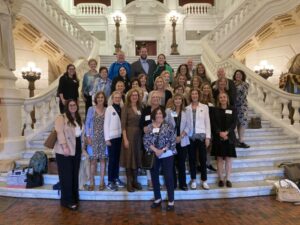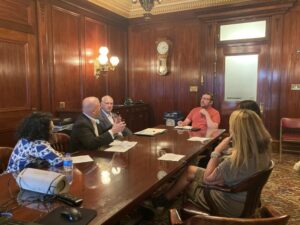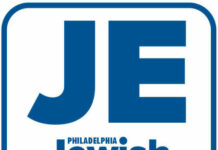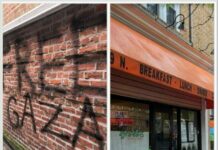
(Courtesy of Dionna Dash/The Jewish Federation of Greater Philadelphia)
Jewish community leaders traveled to Harrisburg on Sept. 12 to talk to state lawmakers and staff about Jewish issues.
And their issues of concern were antisemitism, hate crimes, violence prevention, religious rights, nonprofit security grants and reproductive health, according to an email from the Jewish Federation of Greater Philadelphia. The group included Robin Schatz, the director of government affairs for Jewish Federation; Andrew Goretsky, the regional director of Anti-Defamation League Philadelphia; and Marcia Bronstein, the regional director of the American Jewish Committee Philadelphia/Southern New Jersey.
But they focused on one specific initiative: Pennsylvania’s Nonprofit Security Grant Program. The Jewish community wants more funding for it and to ensure its continuity year to year.
“Over the last eight years, it’s become more accepted for antisemitic sentiments to be brought out to the forefront,” Schatz said.
The program was created in 2019 by Act 83 as a response to the Tree of Life synagogue shooting the previous fall. It gave out $20 million in security grants to synagogues, Jewish community centers and other organizations, including mosques and churches, over its first three years. In 2021, 30 Philadelphia-area Jewish organizations received more than $1.2 million.
In November, then-Gov. Tom Wolf signed an amendment extending the program through 2029. State Sen. Jay Costa, whose 43rd district includes Pittsburgh, said the $5 million for the grants was “carried through” in this year’s state budget.
“We’d like to make this an ongoing thing,” he added.
Costa was not able to meet with the Jewish leaders because he was not in Harrisburg on Sept. 12. But several of his colleagues did. They included Amanda Cappelletti (17th district/Delaware and Montgomery counties), Judith L. Schwank (11th district/Berks County) and Tim Briggs (149th district/Montgomery County).
“They’re all interested in pushing for more money,” Schatz said.
The ADL’s annual audit of antisemitic incidents counted 3,697 in 2022. That set a record for the third time since 2018. (The ADL began conducting its audit in 1979.)
Locally, synagogue leaders are fortifying their High Holiday services with armed guards, police officers and security checks outside their doors.
Earlier this month, leaflets were distributed in Abington Township blaming Jews for the 9/11 terrorist attack, according to Schatz. And in the spring, Tredyffrin Township in Chester County saw swastikas and other antisemitic graffiti pop up in a shopping center, a middle school and a neighborhood.

Schatz said $5 million per year is not enough for the grant program. One year, requests came in totaling $28 million. Philadelphia-area Jewish leaders are pushing to get the funding up to $10 million by 2024-’25. Costa said there was an effort by some lawmakers to increase it to $10 million last year. But it died.
“It just never materialized,” he said.
In addition to increasing funding, local Jewish leaders want to make the program an annual part of the state budget. Right now, it’s not a dedicated line item, according to Schatz. That means that Jewish leaders and their allies in Harrisburg need to argue for it each year.
Grant money is helpful to Jewish organizations that may not be able to afford security measures on their own, according to Schatz. Back when the Jewish Federation kept its headquarters at 21st and Arch streets, it needed a federal grant to pay for bomb shield blast material on the windows.
“We couldn’t necessarily do that on our own at the time,” she said.
Costa said there is support for the program in Harrisburg. But the challenge is convincing more lawmakers to take those additional steps. Schatz said, “A lot of legislators were not aware of the need for increased funding.”
Sen. Sharif Street, whose third district includes Philadelphia, asked Jewish leaders to send him a letter outlining what they want.
Schatz said the plan will be to track legislation and send out action alerts to voters. That way, they can contact their legislators and tell their friends to do the same. The Jewish Federation will also ask local synagogue leaders to inform their congregants.
Mark Mekilo, a staff member for Sen. Vincent Hughes (seventh district/Montgomery and Philadelphia counties), told the Jewish leaders that they should be getting more funding. He also said there would be a “full court press on that” starting in December or January when budget talks begin.
“State funds are much easier to apply for and much faster than if you go through the federal system,” Schatz said.






